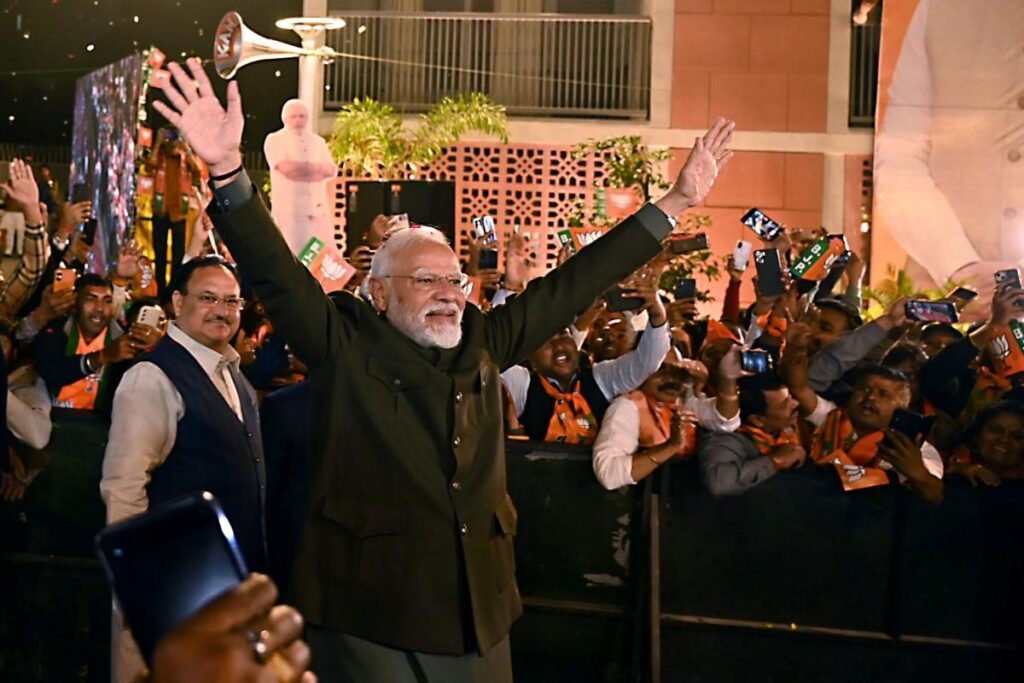(Bloomberg) — Prime Minister Narendra Modi’s victories in three crucial state elections strengthened his party’s position before nationwide polls next year, driving up India’s equity benchmark to a new record high.
Most Read from Bloomberg
Modi’s Bharatiya Janata Party won a majority of the legislature seats in three states predominantly in the populous, northern and central Hindi-speaking heartland of the country, results on Sunday showed. The ruling party unseated the main opposition, the Indian National Congres, in two of the states.
The dominance of the BJP at the polls will give the party momentum as it gears up for general elections in 2024, where Modi is widely expected to extend his decade in office by another five years. Investors say the state results removes an element of political risk and signals continuity in government policy.
There will be even greater confidence that “Modi will carry the day in the next national elections and that the current market friendly policies of the government will be maintained and built upon,” said Gary Dugan, chief investment officer at Dalma Capital Management Ltd.
India’s S&P BSE Sensex Index rose as much as 1.6% in early trading on Monday to mark another record high. Indexes carrying infrastructure-related stocks from power producers to capital goods makers and banks rose more than 2% each to become top gainers among BSE’s Ltd.’s sub-gauges.
Stocks tied to ports-to-power conglomerate Adani Group, which has been closely associated with Modi’s nation-building efforts, also surged. The flagship Adani Enterprises Ltd. jumped as much as 10% to the highest since Sept. 12, while Adani Green Energy Ltd. and Adani Energy Solutions Ltd. rose more than 14% each.
The BJP retained power in Madhya Pradesh, a central state with 56 million voters, and wrested control of Rajasthan and Chhattisgarh from the Congress party. The results were better than exit polls had predicted.
Addressing BJP workers in New Delhi on Sunday, Modi said the election results would “strengthen the world’s faith in India’s development” and “give new faith to the world’s investors.”
The Congress party, led by Rahul Gandhi, was able to flip the southern Indian state of Telangana, which had been governed by a regional party for two consecutive terms. Counting in the small northeastern state of Mizoram, where regional parties dominate, began on Monday.
Welfare Policies
Modi and the BJP’s election plank going into next year will likely center around consolidating the country’s vast Hindu vote, and to highlight popular welfare and development policies that have been championed by the party. India is the fastest growing major economy in the world, and the BJP has sought to cast Modi as a globally important leader who has raised India’s international stature, an approach that plays well with the party’s Hindu nationalist base.
“The BJP’s policies are a mix of efficient policy implementation that helps in consolidation of votes” said Shumita Deveshwar, chief India economist at GlobalData.TS Lombard, pointing to popular policies such as a cash handout scheme for women in Madhya Pradesh. “This helps overcome factors such as inflation, sluggish job creation and anti-incumbency that would otherwise have hurt the BJP.”
Kapil Gupta, an economist at Nuvama Wealth Management, said the election results would ease political risk and boost market sentiment. “This lessens the risk of a populist turn and bodes well for continued government capex,” Gupta said.
The Congress party will now need to regroup with other opposition groups to figure out how to fight Modi in the upcoming national elections. Opposition parties had pledged to form an alliance to unseat the BJP by setting aside their differences and projecting a united front.
Gandhi has positioned himself as Modi’s main challenger, but apart from the wins in two southern states, his party has struggled to peel voters away from the BJP.
–With assistance from Eltaf Najafizada and Dan Strumpf.
(Updates to add stock moves in fifth and sixth paragraph.)
Most Read from Bloomberg Businessweek
©2023 Bloomberg L.P.
Read the full article here

